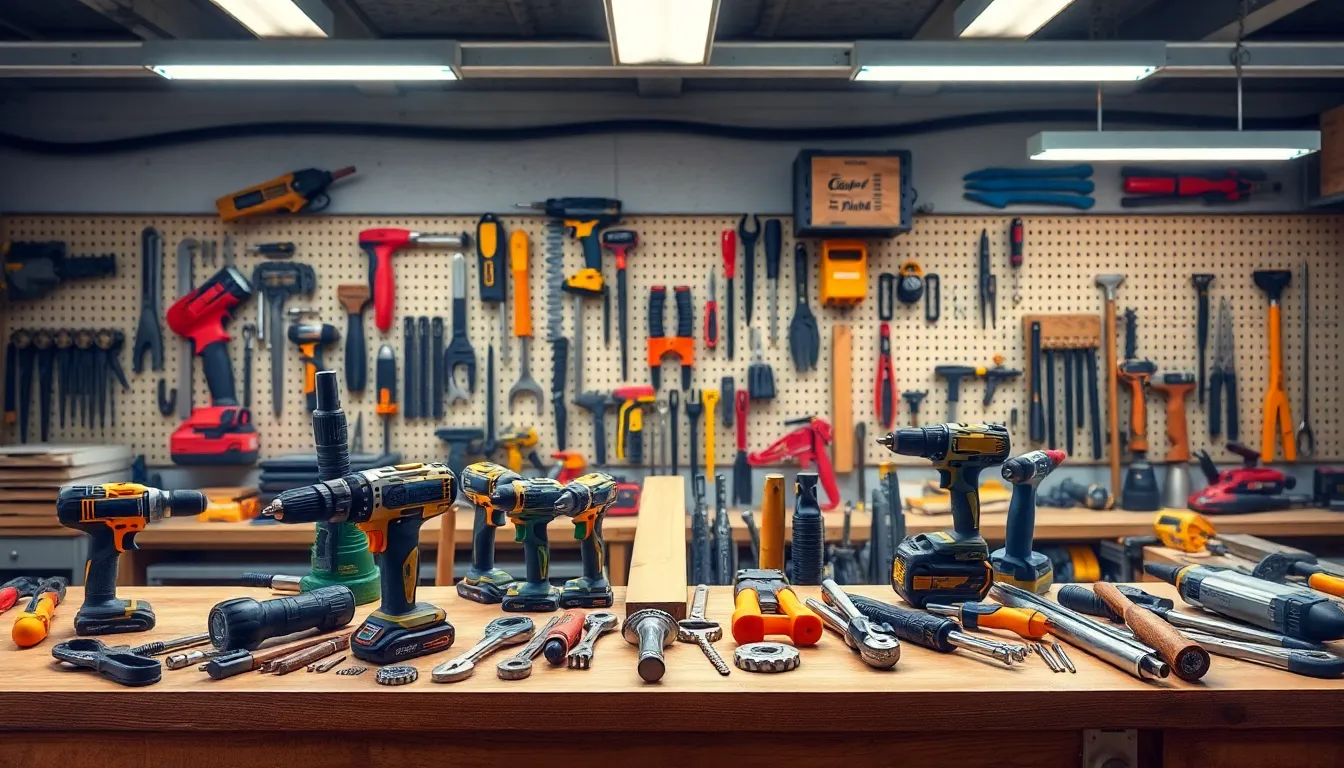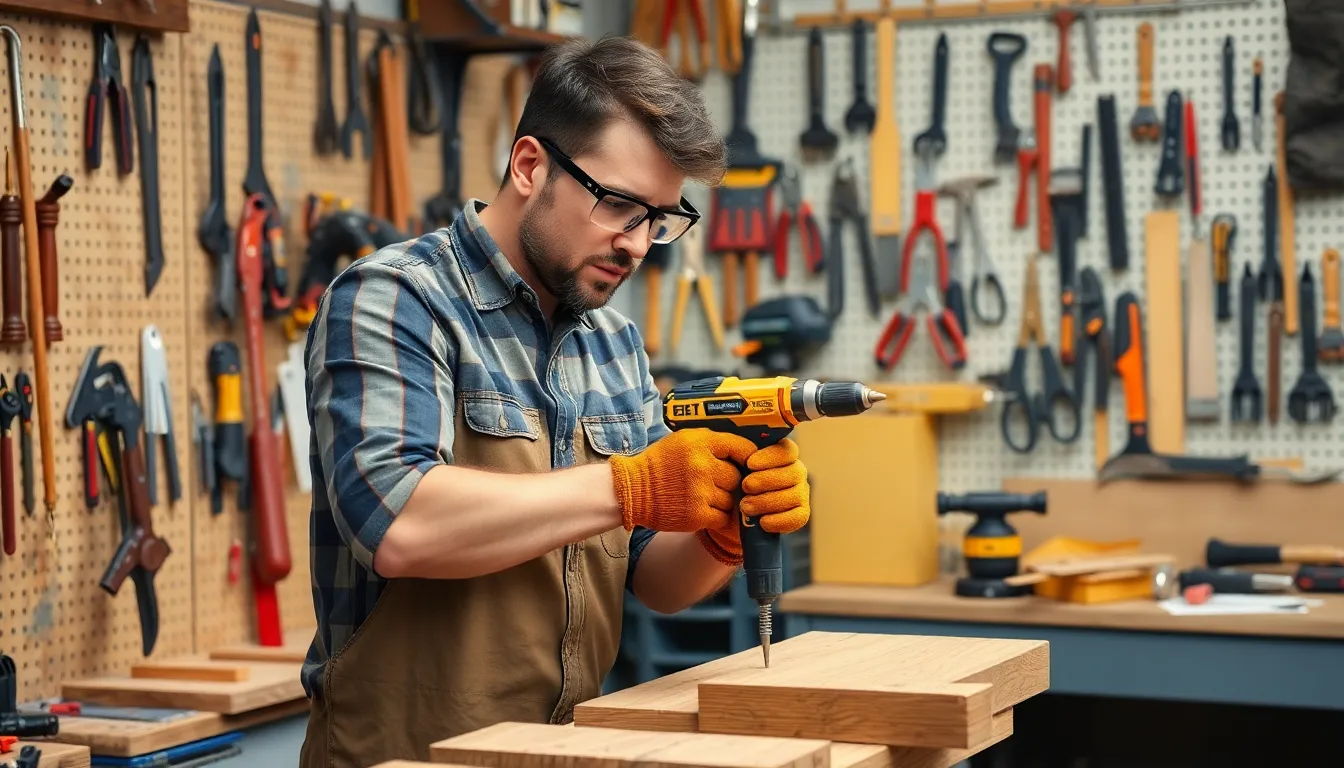Table of Contents
ToggleEvery workshop needs the right tools and equipment to turn dreams into reality. Whether you’re a seasoned pro or a weekend warrior, the right gear can make all the difference. Imagine tackling that DIY project with the precision of a surgeon and the finesse of a master craftsman. Sounds great, right?
From power tools that roar like a lion to hand tools that fit perfectly in your palm, the options are endless. But don’t let the shiny gadgets overwhelm you. Choosing the right tools is like picking the perfect sidekick for your superhero journey. With the right equipment, even the most daunting tasks become manageable—and dare we say, fun! So grab your safety goggles and let’s dive into the world of workshop essentials that’ll have you crafting like a pro in no time.
Types Of Workshop Tools And Equipment
Workshops utilize different types of tools and equipment. Each serves a distinct purpose in completing projects efficiently and effectively.
Hand Tools
Hand tools are essential for detail-oriented tasks. Common tools include hammers, screwdrivers, and pliers. Craftsmen often appreciate the control hand tools provide during intricate work. For instance, a flat-head screwdriver excels at tightening screws while a hammer delivers precise force to drive nails into wood. Quality hand tools enhance craftsmanship and allow for better results in various projects.
Power Tools
Power tools increase efficiency in workshops. Drills, saws, and sanders represent key power tool categories. These electric or battery-operated devices speed up repetitive tasks. For instance, a cordless drill simplifies drilling holes compared to manual options. Electric saws allow users to cut materials quickly and with less effort. Utilizing power tools transforms labor-intensive projects into manageable tasks, saving time and energy.
Specialized Equipment
Specialized equipment caters to specific tasks in workshops. Examples include band saws, planers, and welders. Each piece serves a unique function and often focuses on particular materials, such as metal or wood. A band saw makes intricate cuts in wood, while a welder joins metal pieces seamlessly. Investing in specialized equipment expands capabilities and enhances overall project quality, enabling craftsmen to tackle complex challenges with ease.
Choosing The Right Workshop Tools

Selecting the appropriate workshop tools is crucial for achieving the desired results in any project. Various factors significantly influence this choice.
Factors To Consider
Quality plays a vital role in tool selection. Higher quality tools often perform better and last longer, ensuring reliability during use. Budgeting is essential, as skilled craftsmen need to find a balance between affordability and quality. Consider the specific tasks at hand; some tools are more suited for particular projects than others. Ergonomics can impact comfort during extended use; therefore, selecting well-designed tools is beneficial. Additionally, space availability in the workshop must be assessed, as larger tools require more room for operation and storage.
Common Mistakes To Avoid
Overlooking tool compatibility often leads to frustration during projects. Craftsmen should ensure that tools work well together, especially when using power tools alongside hand tools. Rushing the decision-making process can result in poor choices; taking time to research options often pays off. Ignoring safety features while selecting tools poses risks; prioritize tools with necessary protective measures. Lastly, neglecting maintenance checks on tools can diminish their performance, leading to potential failures during critical tasks. Regular inspection and upkeep help ensure longevity and reliability in the workshop environment.
Maintenance And Care Of Workshop Tools
Proper maintenance and care of workshop tools ensure longevity and optimal performance. Following a routine helps prevent costly repairs and enhances safety during use.
Cleaning Procedures
Cleaning tools after each use keeps them functioning effectively. Wiping down surfaces with a damp cloth removes dust and debris. For power tools, manufacturers recommend checking the user manual for specific cleaning instructions. Lubricating moving parts prevents rust and ensures smooth operation. Regularly sharpening blades and bits maintains cutting efficiency, reducing strain during use. A clean workspace also minimizes accidents related to dirt or clutter.
Storage Solutions
Organizing tools properly prevents wear and tear. Using toolboxes and pegboards keeps tools easily accessible and reduces clutter. Hanging larger tools on walls saves space and prevents damage from falling. Labeling storage areas helps locate tools quickly, enhancing workflow efficiency. Keeping tools in a dry, temperature-controlled environment prevents rust and deterioration. Regularly updating storage solutions accommodates new tools and evolving project needs.
Safety Tips For Using Workshop Tools
Safety is paramount when using workshop tools. Adopting proper precautions can significantly reduce the risk of accidents and injuries.
Personal Protective Equipment
Wearing personal protective equipment (PPE) serves as the first line of defense. Safety goggles protect eyes from flying debris. Ear protection shields hearing from loud power tools. Gloves can prevent cuts and abrasions, while dust masks minimize inhalation of harmful particles. Selecting the appropriate footwear also aids in slip resistance and protects feet from dropped tools. Using PPE whenever operating tools ensures a safer workshop environment.
Best Practices
Implementing best practices enhances safety during tool usage. First, always read the manufacturer’s instructions before starting any tool operation. Keeping the workspace clean and organized reduces trip hazards. Checking tools regularly for wear or damage helps prevent malfunctions. Additionally, maintaining a proper grip on tools and using them as intended ensures control and precision. Lastly, never rush tasks; taking time to focus on the job prevents careless mistakes. Prioritizing these practices creates a safer and more efficient working atmosphere.
Having the right workshop tools and equipment is essential for anyone looking to tackle DIY projects with confidence. By selecting quality hand tools power tools and specialized equipment craftsmen can elevate their work and enjoy the process.
Prioritizing safety and maintenance further enhances the workshop experience ensuring tools remain effective and reliable. With proper organization and care even the most challenging tasks become manageable. Embracing these principles not only leads to better results but also fosters a fulfilling creative environment.





